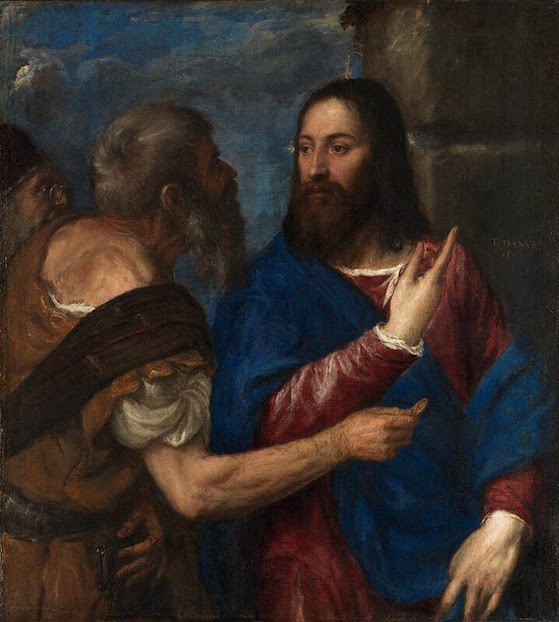Readings (Jerusalem Bible: Australia, England & Wales, Ireland, New Zealand, Pakistan, Scotland)
Readings (New American Bible: Philippines, USA)
Gospel Mark 10:46-52 (shorter form: 10:42-45) (English Standard Version, Anglicised)
As Jesus was
leaving Jericho with his disciples and a great crowd, Bartimaeus, a blind
beggar, the son of Timaeus, was sitting by the roadside. And when he heard that it was Jesus of Nazareth, he
began to cry out and say, “Jesus, Son of David, have mercy on me!” And many rebuked him, telling him to
be silent. But he cried out all the more, “Son of David, have mercy on me!” And Jesus stopped and said, “Call him.” And they called the blind
man, saying to him, “Take heart. Get up; he is calling you.” And throwing off his cloak, he sprang
up and came to Jesus. And Jesus said to him, “What
do you want me to do for you?” And the blind man
said to him, “Rabbi, let me recover my sight.” And Jesus said to him, “Go your way; your faith has made you well.” And immediately he recovered his sight and followed him on the
way.
Fr John Burger is an American Columban who was member of the Columban General Council from 2006 till 2012. He spent the early years of his priesthood in Japan and tells a wonderful story about a blind man who was a member of a prayer group in a parish where he served. Each week the group met to share on the following Sunday’s gospel and to pray. Father John was a little nervous when this Sunday’s gospel came up, wondering how his blind friend would respond.
He and the others were astonished when the man shared that this was one of his favourite passages in the gospels. Why? Because Jesus asked Bartimaeus, What do you want me to do for you? The blind parishioner went on to say that he was quite happy as he was. He had his own apartment and he knew his way around. But if the Lord were to ask him directly What do you want me to do for you? he would tell him that there were parts of his life where he would like Jesus to shed his light, even though he would hesitate to ask him to do so.
Probably the blind Japanese man had experienced people, with every good intention, wanting to help him when he needed no help. On a pilgrimage to Lourdes in Easter Week 1991 with a group of persons from Ireland, some with physical disabilities, I shared a room with our leader, Joe, able-bodied like myself, and Tony and Tom who weren’t. Both needed help in some very personal matters. However, I learned very quickly from Tom not to do something for him when he could do it himself. That was a very good lesson for me.
Jesus didn’t presume that Bartimaeus wanted his sight back. He asked him, What do you want me to do for you? The blind man, who had shouted Jesus, Son of David, a title indicating he was the Messiah, answered, Rabbi, let me recover my sight.
Do I allow Jesus to ask me, What do you want me to do for you? And if I allow him do I have the faith of Bartimaeus to tell him what I want him to do for me? Jesus responded to the faith of the blind man: Go your way; your faith has made you well. And the blind beggar’s response to this was a further expression of his faith: And immediately he recovered his sight and followed him on the way.
On 11 October 2012 in his homily at the Mass marking the opening of the Year of Faith and the 5oth anniversary of the opening of the Second Vatican Council Pope Benedict said, The Year of Faith which we launch today is linked harmoniously with the Church’s whole path over the last fifty years: from the Council, through the Magisterium of the Servant of God Paul VI, who proclaimed a Year of Faith in 1967, up to the Great Jubilee of the year 2000, with which Blessed John Paul II re-proposed to all humanity Jesus Christ as the one Saviour, yesterday, today and forever. Between these two Popes, Paul VI and John Paul II, there was a deep and profound convergence, precisely upon Christ as the centre of the cosmos and of history, and upon the apostolic eagerness to announce him to the world. Jesus is the centre of the Christian faith. The Christian believes in God whose face was revealed by Jesus Christ. He is the fulfilment of the Scriptures and their definitive interpreter. Jesus Christ is not only the object of the faith but, as it says in the Letter to the Hebrews, he is 'the pioneer and the perfecter of our faith' (12:2).
Bartimaeus seemed to have grasped something of this, calling Jesus by a Messianic title, Son of David, putting his faith in him and following him on the way.
Traditional Latin Mass
Our Lord Jesus Christ the King
The Complete Mass in Latin and English is here. (Adjust the date at the top of that page to 10-20-2024 if necessary).
Epistle: Colossians 1:12-20. Gospel: John 18:33-37.














